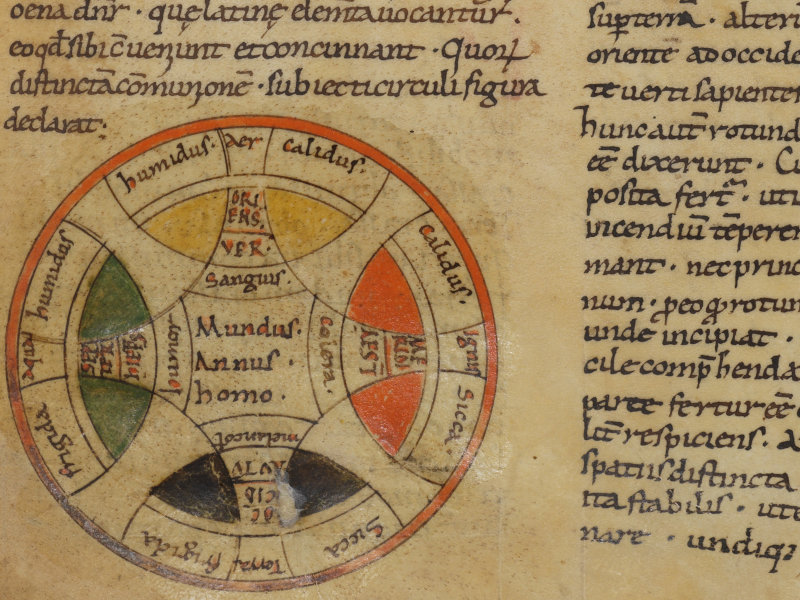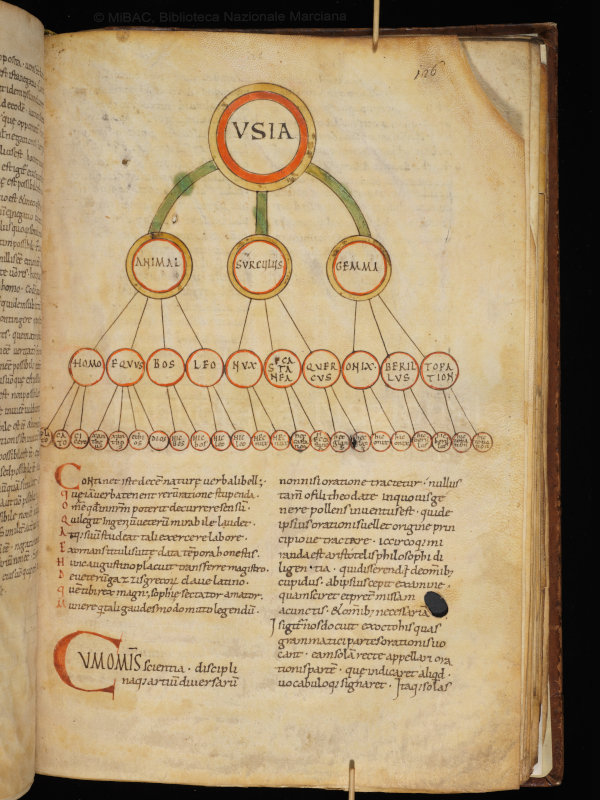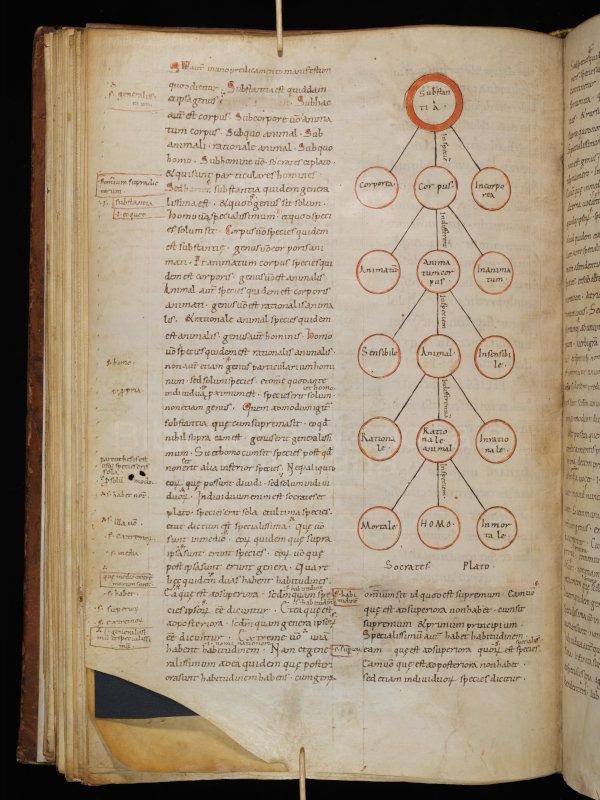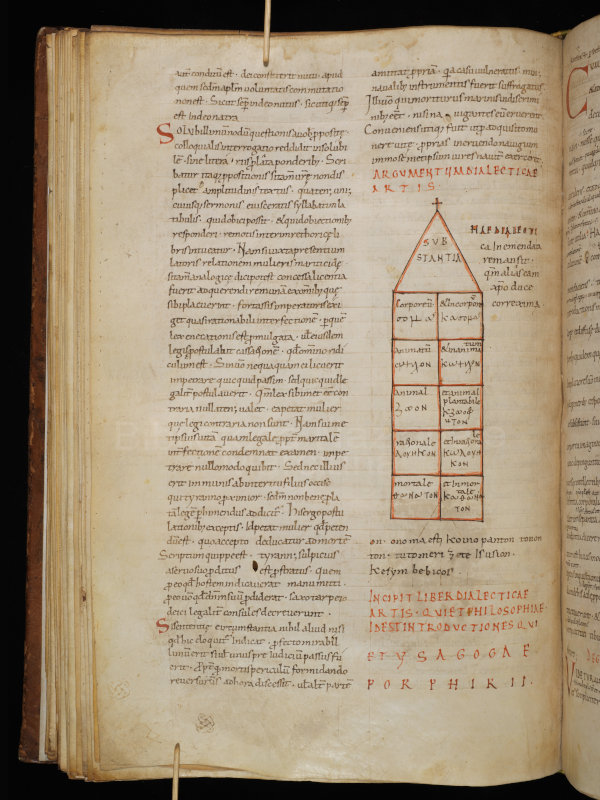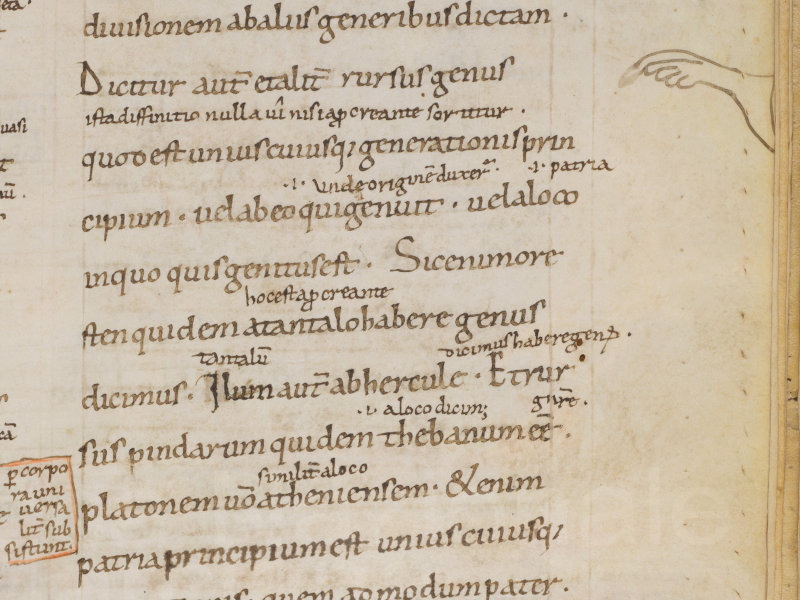Logicalia Medievalia
Latin logical manuscripts before 1220
Project
Welcome to Logicalia medievalia, one of the outreach outcomes of Caterina Tarlazzi's Rita Levi Montalcini research project conducted at at Ca’ Foscari.
The focus of Caterina’s research is the logic of Peter Abelard and his contemporaries - specifically, the so-called 'Problem of Universals', realism, and nominalism - and manuscripts transmitting logical texts in the Latin tradition (especially in the Italian peninsula).
This website has been created in order to draw together recent research on Latin logical texts from before circa 1220. It pays particular attention to research on William of Champeaux and Peter Abelard; on the so-called Long Twelfth Century (1070-1220); and on manuscripts, glosses and diagrams.
The content of the website will expand over time. At the moment, it includes: Yukio Iwakuma's extensive and important digital research material; links to other relevant digital resources; information on recent publications; and news.
Resources
Yukio Iwakuma’s "Website" on Logical Manuscripts (circa 800-1220)
Over an academic career spanning more than forty years, Professor Iwakuma collected information on Latin logical manuscripts from circa 800 to circa 1220. He wrote up basic but informed descriptions of the logical content of more than 700 manuscripts, wrote up lists of relevant material, and transcribed hundreds of logical texts, while also preparing the critical editions of Alcuin's "Dialectica" and of the "Ars Meliduna" (currently in progress; for a recent discussion see his "Struggles with Stemmatics" in Ad Placitum. Pour Irène Rosier-Catach, II, 395-402.
This section of the website hosts material that Professor Iwakuma wishes to make available freely to researchers in the field. At the moment, he is sharing his folder HPMss. The folder is first to be downloaded and then the file 'Home' provides the first entry into the material. This version was last updated on 27/05/2021. (Use of Professor Iwakuma's research material should be duly acknowledged.)
Gallery
The images on this website (reproduced with permission) are taken from manuscript Venezia, Biblioteca Marciana, Lat. Z. 497 (=1811).
Dating back to the 11th century, this is a major collection of texts pertaining to the liberal arts. Among many others, it includes Boethius's Latin translation of Porphyry's Isagoge, with glosses and diagrams, and Pseudo-Augustine's Categoriae Decem. For an analysis of some of these diagrams, see Caterina's The Latin Tradition of Studying Porphyry's Isagoge, ca 800‒980: A Catalogue of Manuscripts, Glosses, and Diagrams in AHDLMA 2020 (stemming from Christophe Erismann's 9SALT project Reassessing Ninth Century Philosophy. A Synchronic Approach to the Logical Traditions).
A recent article by Clelia Crialesi in The Journal of Medieval Latin edits the "Excerptiuncola", a short introduction to Boethius's De arithmetica, to be found on fols. 156v-157r of this important manuscript.
The full digitisation of this manuscript was funded as part of Caterina's research project.
Other online resources
- Robert Pasnau’s "In medias PHIL" includes relevant news, and several recordings of the Medieval Virtual Colloquium; see, for instance, Irène Rosier-Catach’s talk on "The 'linguistic turn' of medieval logic in the early 12th century".
- Recordings of Alain de Libera's lectures at Collège de France are available online.
- The section Che cos'è…? (Swiss Portal for Philosophy) includes a contribution by Caterina on the so-called debate over universals from the time of Peter Abelard.
- The 'Things to download' from Paul Vincent Spade's website are fascinating to browse through.
- Podcasts on Peter Abelard (and Heloise) can be found in Peter Adamson's History of Philosophy without any Gaps and Melvyn Bragg's In Our Time.
- The SIEPM Virtual Library organised by Jean-Luc Solère includes several primary sources; see also the scholarly resources on Peter King's website and Corpus corporum.
Publications
This section of the website hosts information on relevant recent publications (in particular, publications discussing Iwakuma’s research material).
- Forthcoming: Irene Binini, Possibility and Necessity in the Time of Peter Abelard, a monograph soon to appear in Brill’s series, Investigating Medieval Philosophy
- Forthcoming: Irene Binini, Riflessioni sul concetto di necessità nella prima metà del XII secolo, Noctua
- Forthcoming: Parts and Wholes, edited by Andrew Arlig, for the series On What There Was: Conceptions of Being 500-1650
- 2021: Ad placitum. Pour Irène Rosier-Catach. Textes réunis par Laurent Cesalli, Frédéric Goubier, Anne Grondeux, Aurélien Robert, and Luisa Valente, Aracne Editrice.
(Caterina Tarlazzi’s Priscian for Porphyry, c. 1080-1200, which is included in this volume, is available in green open access) - 2020: Grundriss der Geschichte der Philosophie. Die Philosophie des Mittelalters. Band 3/1 und 3/2. 12. Jahrhuhdert. Hg. Laurent Cesalli, Ruedi Imbach, Alain de Libera, Schwabe Verlag
- 2020: Irene Binini, Discussing Modalities in the Mid-Twelfth Century: An Introductory Study of the Introductiones Montane Maiores, the Summa Periermeneias and the Ars Meliduna on the de re/de dicto Distinction, Documenti e studi sulla tradizione filosofica medievale 31 (2020), 89-120, available in open access
- 2020: Mereology in Medieval Logic and Metaphysics. Edited by Fabrizio Amerini, Irene Binini, and Massimo Mugnai, Edizioni della Normale
- 2019: A Companion to Twelfth-Century Schools. Edited by Cédric Giraud, Brill
- 2018: Caterina Tarlazzi, Individui Universali. Il realismo di Gualtiero di Mortagne nel XII secolo. FIDEM / Brepols: Turnhout
- 2017: Anne Grondeux, Irène Rosier-Catach, Priscien lu par Guillaume de Champeaux et son école. Les Notae Dunelmenses (Durham, D.C.L., C.IV.29), Brepols
- 2017: Anne Grondeux, Irène Rosier-Catach, William of Champeaux (c. 1070-1121), The Glosulae on Priscian and the Notae Dunelmenses, Historiographia Linguistica 44.2-3 (2017), 306-330.
See the complete list of Caterina Tarlazzi's publications, including open access.
News and events
- An online meeting that focuses on noetics in the time of Peter Abelard, organised by Laurent Cesalli and Federico Viri, will take place on 16-18 June 2021.
- The 23rd European Symposium of Medieval Logic and Semantics, organised by Magdalena Bieniak, Krystyna Krauze-Błachowicz, Wojciech Wciórka, and Marcin Trepczyński, will be held in Warsaw in June 2022.
Past events
- 13 May 2021: Laurent Cesalli gave an (online) talk at Ca’ Foscari PhD Seminar on Ancient and Medieval Philosophy entitled: "Réalisme et particularisme dans l'ontologie médiévale".
- 11 May 2021: Caterina Tarlazzi gave an (online) talk at Ca’ Foscari Collegio Internazionale, in the series Special on: doing research, entitled: "Polyphonic Philosophy. New Concepts from Research on Logic in the Long Twelfth Century (c. 1070–1220)".
- 5 May 2021: Luisa Valente gave an (online) talk at Ca’ Foscari PhD Seminar on Ancient and Medieval Philosophy, entitled: "Tipi umani e ruolo del filosofo nella società secondo Pietro Abelardo e altri pensatori del XII secolo".
About
Caterina’s Rita Levi Montalcini project (2018) is being conducted at Ca’ Foscari Dipartimento di Filosofia e Beni Culturali and at the Centro di studi sul pensiero medievale Sic et Non.
It benefits from ongoing collaborations with:
- Irene Binini (Università di Parma)
- Laurent Cesalli (Université de Genève, Université de Genève, FNS project “Ce que disent les propositions. Dictum et eventus chez Abélard” with Enrico Donato and Federico Viri)
- Anne Grondeux (CNRS, Paris, edition in progress of the Glosulae in Priscianum maiorem, with Eleonora Lorenzetti)
- Heine Hansen (Saxo institute, Copenhagen)
- Yukio Iwakuma (Fukui Prefectural University)
- John Marenbon (Trinity College, Cambridge)
- Irène Rosier-Catach (EPHE and Paris VII, Paris)
For more information on researching medieval philosophy at Ca’ Foscari, see Centro di studi sul pensiero medievale Sic et Non.

